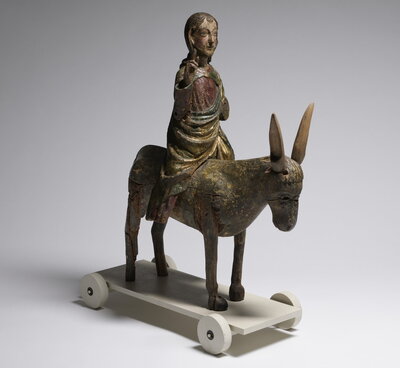Our acting troupe of Illinois students, faculty, staff, and alumni participates in an epic production of the Corpus Christi Cycle at the University of Toronto. Performed annually in the English city of York from the 13th to the 16th centuries, this was a staging of Biblical history from Creation to the Last Judgment performed by 50 civic guilds over the course of one long summer day, beginning at dawn and ending at midnight. In Toronto, we will work alongside some two dozen other groups from all over North America to recreate this experience.
Our troupe's assigned plays are two of the most elaborate of these short Middle English verse dramas: The Entry into Jerusalem (originally performed by the guild of skinners, who supplied the donkey's hide) and The Road to Calvary (assigned to the guild of sheep-shearers). Each pageant must be tightly performed in less than 25 minutes at three different stations on the grounds of Victoria College at the University of Toronto.
Both of these processional pageants will be played as street scenes, fully integrating the dramatic action with audience involvement and emphasizing the immediacy of medieval theater as an always-contemporary performance practice. Although not clustered together in the production, these two plays are mirror images of one another and provide opportunities for linking the festive entry of Jesus to its liturgical inverse, the journey toward crucifixion. Creative choices keep their messages fresh while preserving the integrity of the original texts. An imaginative reconstruction of Calvary's missing manuscript folio has been devised by the cast in rehearsal, featuring the 15th-century "Coventry Carol" as well as a new hymn, "Open My Eyes," written by Miriam Endersby (b. 1999), with music composed by Kristina Arakelyan (b. 1994), commissioned by Multitude of Voyces to mark Holocaust Remembrance Day in 2022.
Read about the Palmesel and its significance here.

